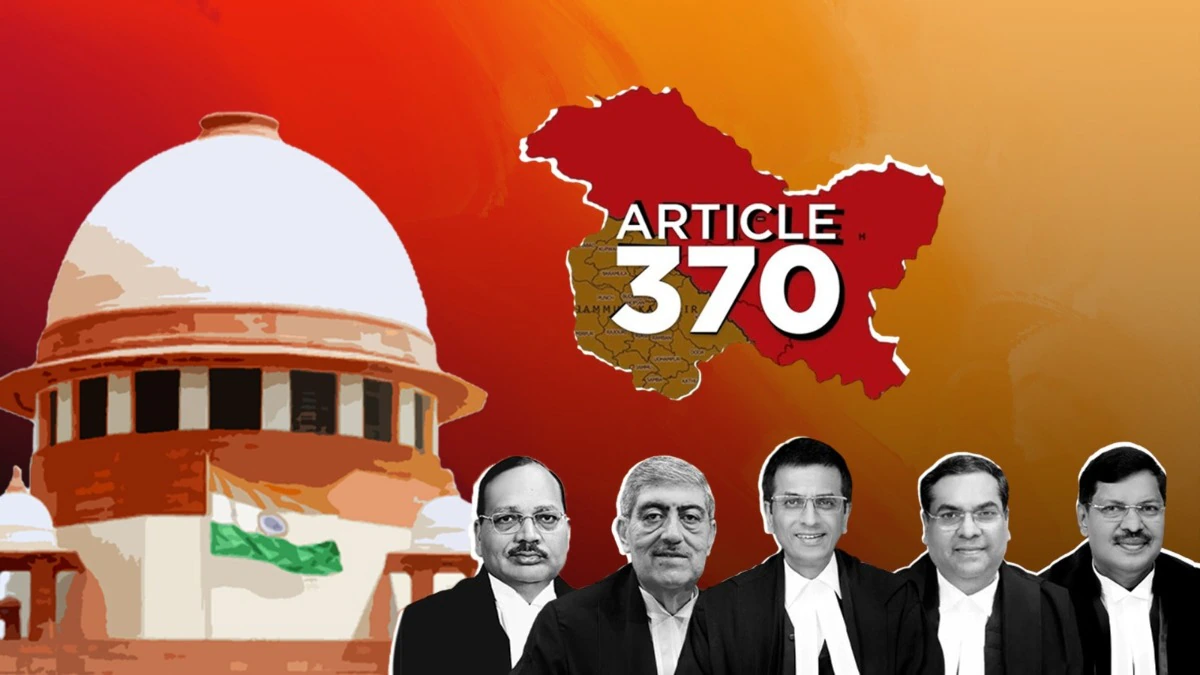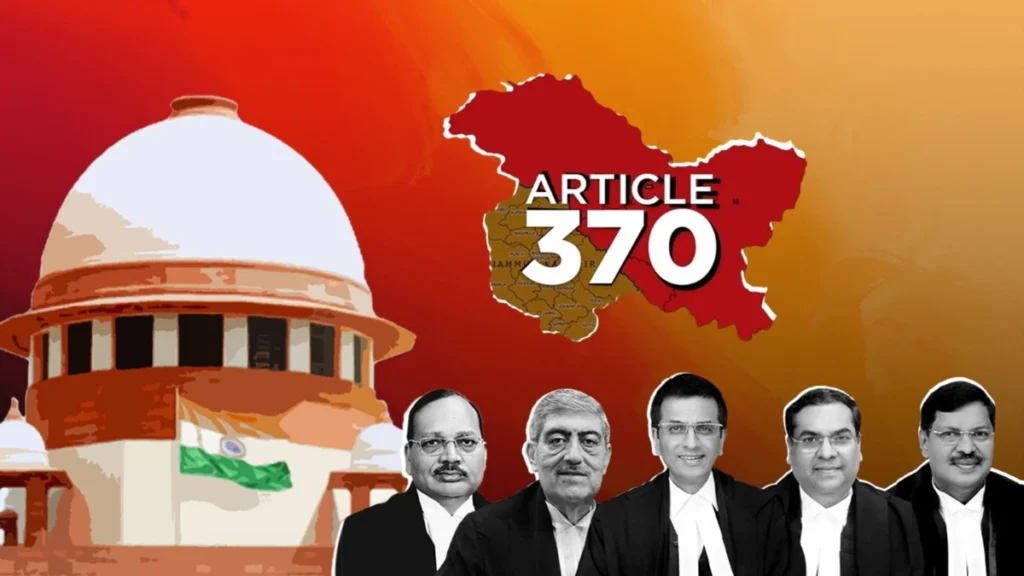ARTICLE 370: Discuss the reasons behind the abrogation and its impact on Jammu and Kashmir


Table of Contents
ToggleINTRODUCTION
The Hon’ble Supreme Court of India delivered a historic judgment on Art 370 and 35A abrogation. Through its judgment, the Court has upheld the sovereignty and integrity of India, something that every Indian cherishes. The Supreme Court observed that the decision taken on 5th August 2019 to repeal Article 370, which ended the special status of the state of J&K, was done to enhance constitutional integration, not disintegration. The Court has also recognized the fact that Article 370 was not permanent.
Explained about Article 370: –
Article 370 in the Indian constitution gave special status to Jammu and Kashmir, a region disputed by India, Pakistan, and China. It was drafted by N Gopala Swami Aiyengar, a member of the Constituent Assembly of India, and was added to the constitution as a ‘temporary provision’ in 1949.
It allowed the state to have its constitution, flag, and autonomy over most matters except defense, foreign affairs, and communications. It was based on the terms of the Instrument of Accession, which was signed by the ruler of Jammu and Kashmir, Hari Singh, in 1947 to join India after an invasion by Pakistan.
Some steps taken by the Government to Repeal Article 370?
Presidential Order:
In the 2019 Presidential orders, Parliament brought a provision giving new meaning to “constituent assembly of Jammu and Kashmir”, to mean “Legislative Assembly of Jammu and Kashmir”, and then assumed the powers of the Legislative Assembly through the Precedential rules to revoke Article 370.
Resolutions in Parliament:
Concurrent resolutions were passed by both houses of the Parliament, the Lok Sabha and the Rajya Sabha, on 5th and 6th August 2019, respectively. These resolutions revoked the remaining provisions of Article 370 and replaced them with new provisions.
Jammu and Kashmir Reorganization Act:
The Jammu and Kashmir Reorganization Act, was passed by Parliament on 5th August 2019. This act bifurcated the state of Jammu and Kashmir into two Union Territories: Jammu, Kashmir, and Ladakh.
Court’s verdict on Article 370:
Art 370 was a Temporary Provision: The court held that Article 370 was a temporary provision and that the State of J&K had no internal sovereignty.
o The court held that Article 370 was meant to be a ‘temporary provision’ for two primary reasons.
• It served a transitional purpose which was to make an interim arrangement to establish a Constituent Assembly of J&K which would draft the State Constitution.
• It was meant to ease the integration of J&K into the Union of India in the light of the prevailing war-like situation in the State back in 1947.
Governor can Assume “all or any” Roles of the State Legislature: The court upheld the proclamations by referring to the landmark 1994 ruling in SR Bommai vs. Union of India which dealt with the powers and limitations of the Governor under the President’s rule.
The CJI said that the governor (President in J&K’s case) can assume “all or any” roles of the state legislature and such action must be tested judicially only in extraordinary cases.
Establishment of ‘Truth and Reconciliation Commission’:
Justice Kaul in his concurring opinion mooted the constitution of a Truth-and-Reconciliation Commission along the lines of the one set up in South Africa after apartheid to address human rights violations both by state and non-state actors in Jammu and Kashmir since the 1980s.
Some important Reasons behind the Abrogation of Article 370:
Integration and Development
Article 370 hindered the complete integration of Jammu and Kashmir into the Indian Union, creating a sense of separatism and impeding its development.
It was believed that full integration would allow for better access to resources, infrastructure, and opportunities for the people of J&K..
National Security:
Article 370 was exploited by Pakistan to support terrorism and separatism in the region. The abrogation would strengthen national security by allowing the Indian government to have more control over the region and crack down on terrorist activities.
Ending Discrimination:
Article 370 discriminated against women, Dalits, and other marginalized groups in Jammu and Kashmir. The abrogation would bring them under the umbrella of Indian laws and provide them with equal rights and opportunities.
Transparency and Accountability:
Article 370 created a lack of transparency and accountability in the governance of Jammu and Kashmir. The abrogation would bring the state under the purview of the Central Vigilance Commission and the Right to Information Act, leading to better governance and accountability.
Economic Prosperity:
Article 370 hindered economic development in Jammu and Kashmir. The abrogation would allow for greater regional investment, tourism, and job creation.
The Impact of the Abrogation of Article 370 in Jammu and Kashmir State:
Decline in violence: There has been a significant decline in violence in Jammu and Kashmir since the abrogation of Article 370.
According to official data, the number of terrorist incidents has decreased by over 50% and security forces have killed over 300 militants in the last four years.
This can be attributed to a combination of factors, including increased security measures, better intelligence gathering, and decreased public support for militancy.
Improved Economic Development:
The government has implemented several initiatives to boost economic development in Jammu and Kashmir, such as the Prime Minister Development Package (PMDP)and the Industrial Development Scheme.
Enhanced Infrastructure:
The government has also invested heavily in infrastructure development in Jammu and Kashmir. This includes projects such as the construction of new roads, bridges, tunnels, and power lines.
These improvements have made it easier for people to travel and do business within the region.
Increased Tourism:
The number of tourists visiting Jammu and Kashmir has increased significantly since the abrogation of Article 370. This is due to a combination of factors, including improved security, better marketing, and the launch of new tourism initiatives.
According to a report, the region of Jammu and Kashmir has seen 1.62 crore tourists in 2022, the highest in India’s 75 years of independence.
Conclusion
The recent judgment by the Supreme Court has not only upheld the principles of ‘Ek Bharat, Shreshtha Bharat’, but it has also served as a powerful reminder of the importance of unity and a collective dedication to good governance. This decision showcases the court’s commitment to strengthening the fabric of our nation and reinforcing the values that define us as a society.



3 comments